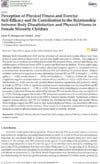Abstract:
Body Dissatisfaction (BD) and low physical self-concept and exercise efficacy have been linked to poor physical fitness levels and adverse health outcomes in children. The purpose of this study was to examine the relationship between BD, physical fitness, exercise self-efficacy, and self-Perception of Physical Fitness (PFP) in Latina and Black female children. Twenty-eight Latina and Black children enrolled in an elementary after-school program, aged 8–12, completed surveys evaluating body dissatisfaction, exercise efficacy, PFP, and measures of physical fitness. Subjects exhibited moderate but significant inverse relationships between BD and PFP in strength (r = −0.459), agility (r = −0.382), aerobic fitness (r = −0.354), and flexibility (r = −0.461) (p < 0.05 for all). There was a significant negative correlation between exercise efficacy and BD (r = −4.2; p < 0.05). Power (r = 0.51) and flexibility (r = 0.42) were the only physical fitness measures significantly and positively related to children’s PFP (p < 0.05). A significant medium inverse relationship was also found between BD and aerobic fitness scores (r = −0.381; p < 0.05). However, after controlling for exercise efficacy or perception of physical fitness, the relationship between BD and aerobic fitness was not significant (p > 0.05). Findings suggest that positive PFP and positive performance in several physical fitness measures are associated with lower levels of BD in minority female children. Furthermore, evidence suggests exercise efficacy and PFP can mediate the relationship body image and aerobic fitness. These findings suggest that PFP, more so than measured physical fitness, was associated with lower levels of BD in minority female children. These results have important implications for programs designed to improve physical fitness and mental health in minority children.



Responses